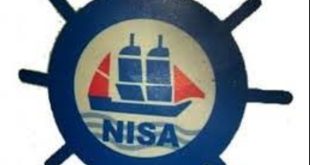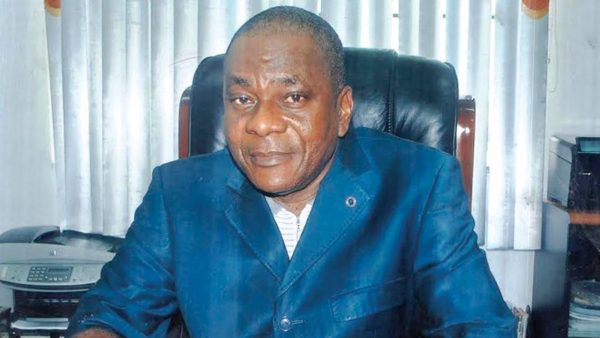
· How sailors survive with N15,000 monthly salary in Nigeria
· NIMASA to investigate poor wages, security challenges
· Port users prepare for imminent Apapa-Wharf road closure
By Kenneth Jukpor
Despite the combined efforts of the Nigerian Navy and the Nigerian Maritime Administration and Safety Agency (NIMASA) to ensure safety of the nation’s territorial waters, sea robbery and piracy has forced sailors onboard fishing vessels in the country to hire thugs for security, paying over N1million for their services per voyage.

According to MMS Plus investigations, most seamen onboard fishing vessels in the country hire at least two armed thugs for security paying them with proceeds of their voyage (fishes and other aquatic products) to the tune of N1million that would have been added revenue for the fishing companies.
Stakeholders continue to express worry over the worsening security situation at the nation’s ports and maritime territories, a development that could trigger more turbulent times for economic activities with its consequent threat to lives and property.
During an exclusive interview with MMS Plus, a sailor in one of the indigenous fish trawling companies, who pleaded anonymity, blamed NIMASA for this problem even as he campaigned for the creation of an active workers’ union to protect the rights of seamen onboard fish trawlers in the country.
“NIMASA isn’t working with us or for us. Fish trawling companies are pushing us to steal to make money because they know that one can’t survive on that salary. You find sailors accept inhuman working conditions because there are no other options. How can a sailor be paid N15,000 as monthly salary? Most of the fishing companies in Nigeria pay this paltry fee; the most you can get is N18,000. It is not the same practice in neighbouring countries like Cameroon”, he said.
According to the source, the lowest salary a sailor should receive is $150 (N54,000) but Nigerian fishing companies insist on paying in naira and a paltry sum of N15,000.
“We need our union that can bring these issues to the public domain so that Nigerians are aware and the government is forced to take actions. There is no insurance policy and no security for sailors. We are left to fight pirates by ourselves; so we hire thugs and pay them up to N1million worth of fishes for our security” he said.
The source who rose to the position of Shrimp Master at Atlantic Shrimpers, also lamented that foreigners were taking over the limited jobs for seamen in Nigeria as a result of the absence of a union that should protect the interest of the workers.
Reacting to this development, the Director, Maritime Labour at the Nigerian Maritime Administration and Safety Agency (NIMASA) Mr. Ibrahim Jibril said; “These ill-fated seamen know that NIMASA exists. The people who find themselves in such circumstance should approach us (NIMASA) and we would intervene because there is no way we can hear this kind of report and not investigate and intervene. When we aren’t aware then it makes it difficult and impossible for us to address the problem”
According to Jibril, such kind of payments for sailors can be described as an abuse of labour. “It amounts to abuse of labour for someone to work at that level as a sailor and earn pittance. That is even below the minimum wage.” He said.
When quizzed on how Nigerian seamen survive with such abysmal salary, our source explained, “It is the remnants of the fishes and shrimps that we are able to keep after remitting that of the company that makes us do the work. We pay the thugs with these fishes after the trip. Sometimes we give them fishes worth N1million for two of them; while we sell the others for N3million-N5million. That is how we get around N300,000 to N400,000 per person after each trip. If you have a generous Captain you can be sure of over N300,000 per trip but with a greedy one you may get N150,000- N200,000”.
According to the Shrimp Master, most sailors have been deprived opportunities to report the excesses of fishing companies in the country because they are always told not to come to work on certain days when the regulatory agencies pay working visits.
Some of these challenges explain why the fish trawling industry in Nigeria which was a major employer of labour with significant contribution to the Gross Domestic Product (GDP) of the country three decades ago, has now become lessons from history.
On his part, the Lagos Coordinator, Nigerian Indigenous Ship-owners Association (NISA) Capt. Taiwo Franklin Akinpelumi blamed sailors for destroying the fish trawling industry that once had over 300 licensed fish trawling companies employing a sizable number of the nation’s youths.
“The reason fishing business is no longer a lucrative business in the country is because of these kinds of sailors. Why should a sailor who knows his onions agree to collect N15,000 as salary if he doesn’t plan to steal the company dry? Most of these companies are aware that they steal their products so they place them on nominal salaries to minimize their losses”, Capt. Taiwo said.
Capt. Taiwo argued that NIMASA and the fishing companies deserve condemnation for the insecurity and low salaries of sailors but he maintained that the high rate of armed robbery at sea stem from the awareness that seamen sell products on the high sea.
According to Capt. Taiwo, pirates have become increasingly aware that sailors sell fishes, crude and other commodities on the high sea; so they attack the vessels to rob them of this illegally made money.
“How else do you explain the fact that a sailor who has risen to the position of Shrimp Master, collecting N15,000 as salary? It’s the same problem across the shipping industry because most captains receive N350,000 to N500,000 as salary when they should be getting $8,000 (N3million) as monthly salary. They accept these salaries because they plan to steal and the companies are also aware of these sharp practices” he added.
· Port users prepare for imminent Apapa-Wharf road closure
Following Dangote Construction Company’s recent announcement that it plans to close both sides of the Wharf Road inward and outward Apapa for four weeks, and the Federal Ministry of Power, Works and Housing planning to shut the Marine Bridge in Apapa for permanent repairs, port users of the nation’s premier port have started preparing for what may be the worst season economically.
At such a time, the functionality of railways, waterways and piping transport modes should be expected to ease the economic and operational burden on port operators, but the dilapidated state of the railway, unavailability of piping and poor patronage of waterways has put the nation in very difficult situation with the imminent closure of the critical Apapa port access road.
Speaking to MMS Plus during an exclusive chat, the Public Relations Officer of National Association of Government Approved Freight Forwarders (NAGAFF) Apapa chapter, Mr. Peter Tompeng said; “They have to close the road irrespective of the economic implication. We need to make some sacrifice to get the road back to a proper one. The quality of the road in Apapa is fantastic but there is need to exercise patience to get it done properly and speedily. The stakeholders, port users and residents who use cars along that route have to look for alternative measures but are there any viable alternatives?”
Mr. Peter lamented that the alternative roads were also in dilapidated conditions, even as he stated that some businesses would have to close down for the period while others would have to prepare for colossal losses during the road closure.
NIMASA Director, Maritime Labour, Mr. Ibrahim Jibril also re-echoed Peter’s opinion as he stated that the Apapa-Wharf road would have to be closed down if any significant and efficient road would have to be constructed.
“Several businesses would be affected if the road has to be closed but I think that is the only way to go about the repairs of the Apapa-Wharf road. Total closure is the price that we all have to pay for allowing the road to deteriorate to such an extent. I believe the construction company had clearly thought about the best way to go about the construction and reached the conclusion that total closure of the road is the best way to fix it” he said.
Jibril, who is also the President of the Chartered Institute of Logistics and Transport (CILT) Nigeria, posited that the Federal Government shouldn’t have allowed such critical road infrastructure to deteriorate to such an appalling state.
Meanwhile, Mr. Lucky Amiwero has admonished the Federal Government to carryout speedy palliative works on Tin Can Island Port access road as part of efforts to dissipate the burden of Apapa-Wharf road closure.
Amiwero made his position known in a recent letter to President Mohammadu Buhari, titled;“The closure of Ijora Wharf Bridge and the pallative work on Tin Can axis port road”
“We wish to bring to the attention of the Federal Government, the economic implication of the propose closure of the Ijora Apapa wharf bridge for four months. There is an urgent need to conclude the palliative work on the Tin Can Island road axis of the Apapa Oshodi expressway, before the closure of the Ijora Apapa Wharf bridge that is used as holding bay to en-route to Apapa Port, which puts pressure on the bridge” the letter read.
According to Amiwero, the proposed closure of the Ijora Apapa Wharf Bridge, without the rehabilitation of Tin Can Island road axis that connects the four major ports in Lagos, will greatly affect the movement of goods into and out of the ports, which will lead to close down of operation in the ports in Lagos.
He also expressed worry that Lagos ports might be declared force majeure, due to operational difficulties in going in and out of the port, which will necessitate shipping lines to divert cargoes to neighbouring West African ports, to reduce stay time of ships and cargoes.
 MMS PLUS NG – Maritime, Aviation, Business, Oil and Gas News Online Newspaper with coverage in Maritime, Oil and Gas, Aviation, Power and Energy as well as Financial News
MMS PLUS NG – Maritime, Aviation, Business, Oil and Gas News Online Newspaper with coverage in Maritime, Oil and Gas, Aviation, Power and Energy as well as Financial News









